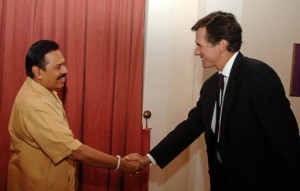Sri Lanka’s government under pressure – Turning the screw
Sep 15th 2011, 15:00 by The Economist online | THE United States is not in the business of threatening its friends, said Robert O.

Robert Blake shakes hands with President Rajapakse on September 12, 20011 in Colombo. Photo taken from http://news.yahoo.com/photos/photo-of-the-day-slideshow-1309242001-slideshow/robert-blake-met-sri-lankan-president-mahinda-rajapakse-photo-073419728.html
Blake, US assistant secretary of state, in Colombo on September 14th. But, he added, smiling placidly, there will be pressure. If a domestic commission appointed by Mahinda Rajapaksa, Sri Lanka’s president, does not provide credible answers to allegations of war crimes committed by the military, demands for “some sort of alternative mechanism” will mount.
Ever since its war with Tamil Tiger rebels ended horrifically in 2009, the government has fended off calls for international action. On September 12th, UN Secretary-General Ban Ki-moon sent a damning dossier about the war’s conduct to the UN Human Rights Council and to the UN High Commissioner for Human Rights. Produced in March 2010 by experts that Mr Ban appointed, it finds credible allegations of war crimes perpetrated by the military and the Liberation Tigers of Tamil Eelam. It says troops shelled areas where civilians were encouraged to gather and systematically fired on hospitals.
The government rejected the panel and the report. It declined, too, Mr Ban’s invitation to respond formally to the charges. Instead, the defence ministry released its own 170-page version of the ‘humanitarian operation’, as the government calls it. In it, the Sri Lankan government finally admitted it was impossible to avoid civilian casualties in a battle of such magnitude. Mr Ban also referred this document to the council and to the commissioner.
The 47-member council can now decide what to do with both. One of the options that might be considered, particularly by European countries backed by the US, is a resolution against Sri Lanka at the council’s sessions in March 2011. Another is a fact-finding mission to Sri Lanka.
The government is already marshalling its friends to block or vote down a resolution. Foremost among them are China, Russia and Pakistan, all of whom funnelled stashes of weapons to Sri Lanka during the war. Colombo is also likely to benefit from the composition of the HRC; the majority of members are developing African, Asian and Latin American states with their own civil conflicts to battle and an aversion to Western involvement.
A fact-finding mission will get nowhere if the government refuses visas to its members; indeed, Mr Ban’s expert panel was denied entry despite repeated requests. But diplomats warn that such intransigence will only harden the position of countries who want to see accountability for war crimes.
This is already being felt. Swiss media said on September 14th that Sri Lanka has recalled one of its diplomats to Colombo over accusations of involvement in war crimes. Jagath Dias, a former frontline army commander, was posted in Berlin as deputy ambassador to Germany. The mission is also accredited to Switzerland.
Sri Lanka said he was returning at the end of his term. In response to a parliamentary question, the Swiss government said on August 31st that it had raised the allegations against Mr Dias with Sri Lanka through a demarche but did not reveal details.
Others might follow if Sri Lanka’s domestic mechanism—the Lessons Learnt and Reconciliation Commission—fails to stand the test. Rights groups have already dismissed this exercise saying its mandate does not explicitly require the commission to investigate alleged war crimes.
ndeed, the government never said it would. Mahinda Samarasinghe, President Rajapaksa’s human rights envoy, told the HRC on September 12th, that the commission was “inquiring into the conflict and its causes” and would make recommendations to ensure “such a situation never arises again in Sri Lanka”.
This would fall well short of the accountability expected. And prattle about recommendations is irrelevant when even the five simple suggestions made a year ago in the commission’s interim report—none of them to do with answering for war crimes—go largely ignored.
http://www.economist.com/blogs/banyan/2011/09/sri-lankas-government-under-pressure
